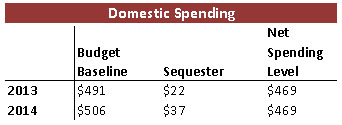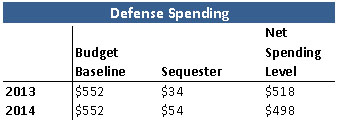Why is the Pentagon facing an “extra” $20 billion in cuts under sequestration next year? Yesterday I said that it was due to a redefinition of “security” in the budget language between 2013 and 2014. Today, CAP’s Michael Linden tells me that although it’s possible this played a role, the real answer lies elsewhere. What follows is fairly number-heavy, and if you don’t want to read it, I don’t blame you. But I’ll try to keep it as simple as I can.
Here’s the main issue: it turns out that under the Budget Control Act, the baseline budget for domestic spending goes up between 2013 and 2014. But it stays flat for defense spending. In addition, the amount of the sequester goes up because (a) it’s for a full 12 months, and (b) the fiscal cliff deal reduced the 2013 sequester levels.
For 2014, the sequester amount is roughly $54 billion for both domestic and defense. However, about $17 billion of the domestic sequester is for mandatory spending (primarily in reduced Medicare reimbursements). Once that’s all netted out, here are the numbers for domestic discretionary spending:

As you can see, the net spending level in 2014 is the same as 2013 because the budget baseline went up enough to make up for the increased sequester. But here are the numbers for defense discretionary spending:

The net effect of all this is that defense spending has to decrease by $20 billion compared to last year, while domestic spending stays at the same level. This is a one-time effect, since the baselines for both domestic and defense spending rise slightly each year in 2015 and beyond.
So that’s the story. If you’re sorry you asked, join the club.

















